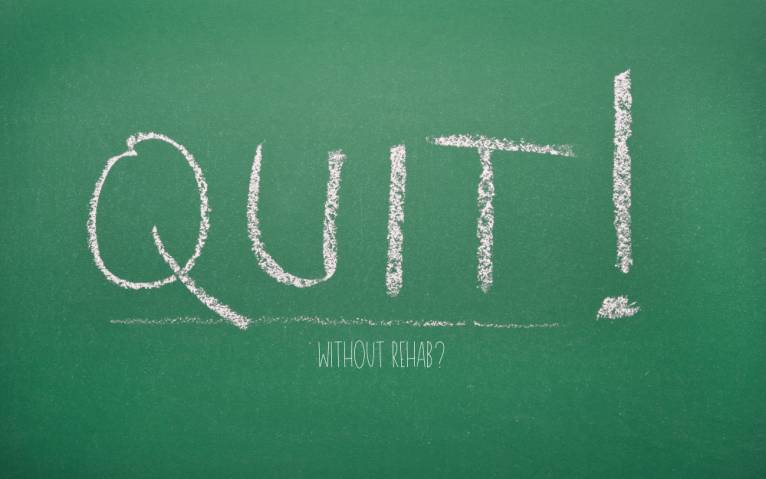So many drug addicts try to quit without rehab at least once. They all believe they have the tools, willpower, and strategies to quit on their own. However, many who try eventually fail. While there’s no denying that some addicts can recover without rehab, this isn’t the reality for most of them. Furthermore, there’s a vast difference between recovering from addiction and making it through the detox process. Let’s explore a bit more whether or not addicts can recover without rehab.
Why People Choose to Quit Without Rehab
Trying to get sober without rehab is very common. Some people refuse to see professional addiction treatment as an option. Others can’t pass their personal reasons that keep them from getting treatment.
However, some specific factors like embarrassment, denial, lack of resources, and financial issues come in the way of recovery. To start, those with a drug abuse problem would have to take an absence from work, school, and their families to attend rehab. Trying to explain this without the embarrassment of admitting their addiction is nearly impossible for them.
Even still, one of the biggest excuses people use to avoid rehab is their finances. The cost of enrolling in a drug treatment program can be high for many. A high-quality treatment center isn’t always affordable. However, there are many ways to pay for drug rehab without insurance.
Risks of Quitting Without Rehab
It’s not at all uncommon for people to try to create a rehab program on their own. These DIY rehab programs or rehab at home ideas can be quite dangerous. However, there are some risks, and things rehab at home cannot give people:
- Exposure to life-threatening withdrawal symptoms without medical attention
- Lack of support in the early stages of recovery to prevent relapse
- Exposure to triggers at home, work, and surroundings
- Fewer opportunities to start building sober social relationships
- Lack of comprehensive care by medical staff and licensed therapists
What Happens When People Quit Drugs Cold-Turkey
Without the proper knowledge, most people will try to quit their drug addiction cold-turkey. Abruptly stopping drug and alcohol use is probably the most commonly used method to quit. While it seems like a straightforward solution, addiction is more complicated than that. In fact, research shows that trying to quit cold-turkey can be risky, dangerous, and often life-threatening.
Some people might experience severe withdrawal symptoms that cause heart issues, seizures, and tremors. Some people might even due to withdrawal complications like hallucinations, strokes, and dehydration.
Not to mention, there’s a high risk of relapse and overdose. Most drugs will cause intense cravings and uncomfortable withdrawal symptoms as they exit the system. When this happens, people are likely to go back to their substances, often at the same or higher doses. This places them at higher risk of overdose. Thus, without the proper surveillance, they can die.
Of course, this isn’t to say some people haven’t been successful at quitting cold-turkey. There’s a myriad of factors that play a role, such as:
- The level of severity of physical dependence and tolerance
- The severity of the physical and psychological addiction
- The type of substance used
- How long they’ve been addicted to these substances
- If they are polydrug users
Substances all act very differently. For example, alcohol, benzodiazepines, and opiates are often abused for long periods of time. Trying to quit without rehab can be life-threatening and challenging.
Why Abstinence and Recovery Are Not the Same
When people talk about how addicts can recover without rehab, they’re not necessarily talking about recovery but abstinence. Of course, some alternatives to rehab can be helpful, the most recognizable: meetings.
One of the most used ways to get sober without rehab is by attending support meetings like Alcoholics Anonymous or Narcotics Anonymous. These meetings are donation-based meetings, held weekly at public buildings, and available to anyone who wants to get sober. However, these meetings are more useful for those who’ve completed rehab or another form of treatment.
When referring to “recovery,” we’re not talking about abstinence from a substance. Addiction recovery entails a positive change in how a person thinks, behaves, and sees the world. More than addressing the substance abuse itself, recovery is about tackling the addictive behaviors and negative patterns.
The truth is, the addiction treatment continues long after detox and extends past after rehab ends. This is why so many treatment facilities offer aftercare programs that provide structure, safety, and support as people start to transition from addiction to sobriety. Studies show that social services, recovery support, and access to sober living homes help people maintain lasting recovery.
Let’s Talk
While it’s possible to get sober without rehab, it is unlikely that someone will find long-term recovery. Rehab programs incorporate behavioral therapy, support groups, and other evidence-based treatment offers that promote a sober lifestyle and treat drug addiction from the source. We know that substance use disorder is a complex disease of the brain that involves much more than just taking drugs or drinking alcohol.
If you or someone you know is struggling with addiction to alcohol or drugs, please seek help. The recovery journey will be filled with many upside downs, but our therapists will be there every step of the way, showing you the light to recovery.





